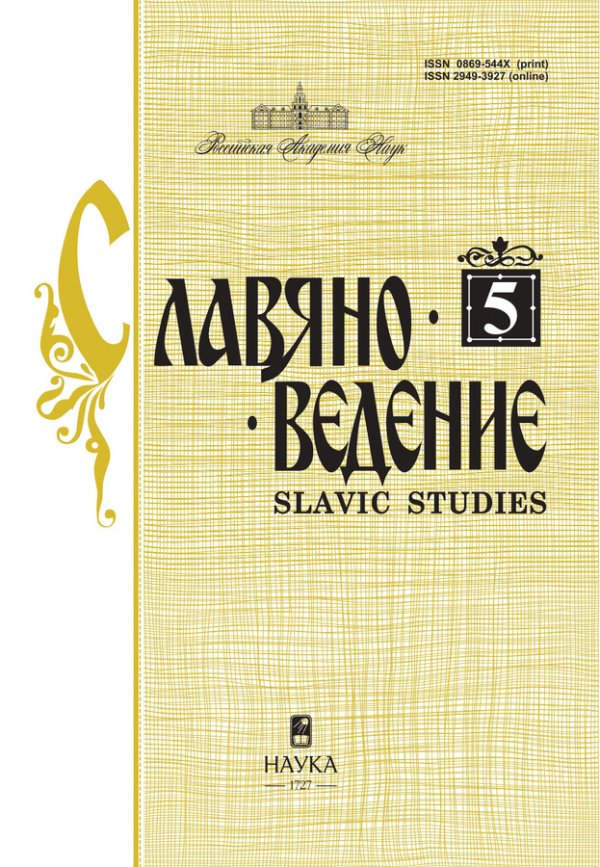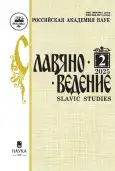The «old age» as a Value in Bulgarian and Modern Greek Phraseology
- Authors: Markou C.G.1
-
Affiliations:
- Democritus University of Thrace
- Issue: No 2 (2025)
- Pages: 119-127
- Section: К юбилею Ирины Александровны Седаковой
- URL: https://rjsvd.com/0869-544X/article/view/680828
- DOI: https://doi.org/10.31857/S0869544X25020118
- EDN: https://elibrary.ru/IYHJZY
- ID: 680828
Cite item
Abstract
The article deals with the axiological characteristics of the concept ‘old age’, revealed on the basis of the phraseological material of Bulgarian and Modern Greek languages. The working corpus contains phraseological units of different degrees of stability: both idioms and more or less fixed collocations. Special attention is paid to the complexity and ambivalence of the evaluation of the concept ‘old age’, as well as to the transition within its framework from value to anti-value. Our results confirm our preliminary hypothesis that, despite significant cultural and axiological parallels, there is a high degree of linguistic specificity in the encoding of the concept ‘old age’. In both languages, phraseological units in which old people are the object of irony and ridicule quantitatively exceed all others. In addition, this category includes units with relatively low interlingual equivalence and a high degree of linguistic and cultural specificity.
Keywords
Full Text
About the authors
Christina G. Markou
Democritus University of Thrace
Author for correspondence.
Email: cmarkou@bscc.duth.gr
ORCID iD: 0000-0002-8001-4933
PhD (Philologу), Рrofessor
Greece, KomotiniReferences
- Baranov A., Dobrovol’skii D. Idiomatichnost’ i idiomy. Voprosy iazykoznaniia, 1996, no. 5, pp. 51–64. (In Russ.)
- Deĭkova H., Garova M. Istoriko-tipologichno izsledvane na rechnikoviia sŭstav na bŭlgarskiia i polskiia ezik (dumi s nachalno h-/ch-, h-). Praslaviansko leksikalno nasledstvo v bŭlgarskiia i v polskiia ezik. Izvestiia na IBE «Prof. Liubomir Andreĭchin». Sofiia, Izdatelstvo na BAN «Prof. Marin Drinov» Publ., 2015, pp. 7–52. (In Bulg.)
- Iavorskaia G. Jevropa v ukrainskikh tekstakh (k probleme variativnosti kontsepta). Etnolingwistyka, 2013, no. 25, pp. 45 – 58. (In Russ.)
- Krumova-Tsvetkova L. Bŭlgarskite blagoslovii, pozhelaniia i kletvi – chast ot natsionalnata samobitnost i kulturnoto nasledstvo. Sofiia, IK «Emas» Publ., 2010, 448 p. (In Bulg.)
- Puchner W. Ta girateia stin paradosiaki laiki antilipsi. Apo ton sevasmo stin apaxiosi. // (M. G. Meraklis, A. N. Doulaveras, A. E. Papakyparissis, M. G. Sergis (epim.) Triti Ilikia. Diachroniki kai diepistimoniki prosengisi, Thessaloniki, Stamoulis 2022, pp. 335–347. (In Greek)
- Sedakova I.A. Aksiologia na starostta v balgarskata traditsionna kartina na sveta. Balgarska etnologia. Materiali ot Treti mezhdunaroden kongres po balgaristika. Sofia, «Sv. Kliment Ohridski» Publ., 2014, pp. 96–110. (In Bulg.)
- Sedakova I.A. Aksiologiia starosti v traditsionnoi kartine mira bolgar (na obshcheslavianskom fone). Kategoriia otsenki i sistema tsennostei v iazyke i kul’ture, Moscow, Indrik Publ., 2015, pp. 237–258. (In Rus.)
- Sedakova I.A., Kitanova M., Zheniukh P. Predislovije. Vzgliad na slavianskuiu aksiologiiu. Moscow, Institut slavianovedeniia RAN Publ., 2019, pp. 7–8. (In Russ.)
- Sergis M.G. Diavatiries teletourgies ston mikrasiatiko Ponto (teli 19ou ai. –1922): Gennisi, gamos, Thanatos. Athina, Irodotos Publ., 2007, 352 p. (In Greek)
- Slavova V. Starostta i ostariavaneto v predstavite na sŭvremenniia chovek. Izvestiia na Sŭiuza na uchenite, 1/2018, pp. 68–71. (In Bulg.)
Supplementary files











